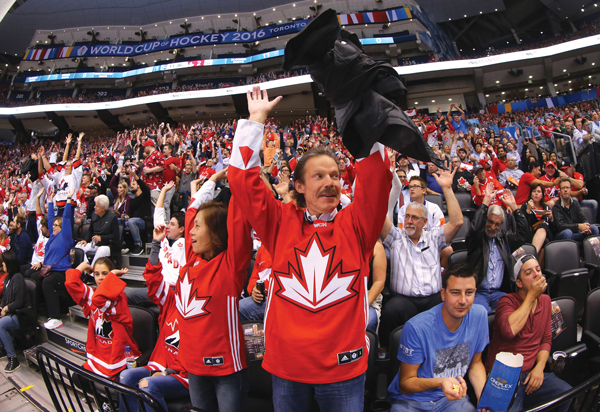 |
The games, all in Toronto, were essentially a sellout, the NHL said.
Photo by: GETTY IMAGES
|
If the NHL and NHL Players’ Association were going to relaunch the World Cup of Hockey, Commissioner Gary Bettman thought there was only one way to do it: “It had to be a big deal out of the box,” he said.
“That’s why one city, that’s why Toronto, that’s why the fan village, that’s why the concerts, that’s why the legacy projects and programs. And when you look at the magnitude, it does re-establish the World Cup as a big deal,” Bettman said.
Based off the event’s performance relative to the league’s projections, the 2016 tournament, which wrapped up play last week, has done that.
While final calculations will not be finished for months, the two-week tournament is expected to generate more than $110 million in revenue, sources said. Initial revenue estimates were in the $90 million-$100 million range, with the additional growth coming from a strong commercial response from global television rights and advertisers. Corporate sponsorship revenue exceeded $25 million, thanks in part to a jersey advertisement deal with SAP.
The most recent tournament, played in 2004, generated a profit of about $4 million. A profit figure for this year’s event is not expected to be available for some time.
Bettman declined to comment on revenue figures, noting that putting the World Cup of Hockey back on the league’s calendar was more about “bringing back something that is important to hockey. The money is secondary.”
While some afternoon games did feature spotty attendance throughout the 19,800-seat Air Canada Centre, the NHL reported that all of the games were essentially sellouts thanks to the sales of ticket strips to all of the tournament’s games. The fan village, set nearby in Toronto’s distillery district, was the league’s largest fan activation in its history — costing in the high seven figures — and attracted more than 100,000 total visitors. The league also employed new technological advancements it hopes will extend to other league events and potentially regular-season games soon. That included digitally enhanced dasherboards that can insert broadcast-specific advertisements, and player and puck tracking.
Successes with the event has the league thinking about what’s next not only for this tournament but also for other international opportunities. Bettman said the NHL executive team will sit down with NHLPA Executive Director Don Fehr and his staff to determine the next steps.
Internally at the NHL, there has been some early discussion on where and how the next World Cup is played. The league is mindful that there are few cities outside of Toronto with a hockey audience that could fill an arena for 17-plus games. The league has considered splitting hosting duties between multiple cities — likely all NHL markets — to drive demand. The 2004 tournament had seven host venues, including four European cities for region-specific pool and quarterfinal games, before playing the final two games in Toronto.
Bettman said many cities, league owners, sports commissions and ice hockey federations have expressed interest, but declined to reveal any of them. He said the league has not yet determined how future bidding processes might work.
While no formal bidding timeline has been set, markets including Edmonton, Chicago, New York City, Pittsburgh and Moscow-St. Petersburg have all expressed interest in hosting the tournament.
There also is the question of teams and the format. Initially met with criticism, the two teams created specifically for this event to maximize the number of NHL stars competing — Team North America, made up of players 23 and under, and Team Europe, featuring players from countries without teams at the tournament — played well and were popular with fans. A qualification tournament would allow more countries the opportunity to participate, but would require the “created” teams to be dropped or the tournament to be expanded.
The biggest question is the relationship between the NHL and NHLPA and the effect that might have on future tournaments. The next edition is loosely set for 2020, but no formal decision has been made.
Bettman noted that in the years that followed the 2004 World Cup of Hockey, the union went through four executive directors, making an event that it hosts jointly more difficult. He said that under the leadership of Fehr, who joined in 2010, the league now has a “strong partner.”
“I think this event is a good reflection on our partnership and how we can work together,” Bettman said. “That doesn’t mean we’re going to agree on everything either now or going forward, but there is an element of trust that develops when you do something good together.”
In the 10-year collective-bargaining agreement that was signed in 2013, both sides hold the option to opt out after eight years, with the NHL getting the first chance by Sept. 1, 2019, and the union having the option to do so by Sept. 19, 2019.




